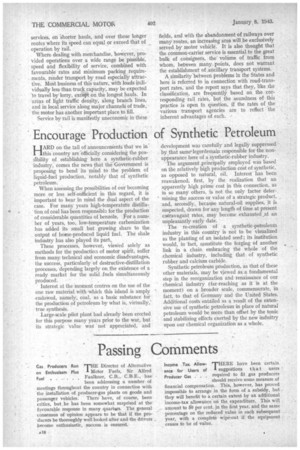Encourage Production of Synthetic Petroleum
Page 18

If you've noticed an error in this article please click here to report it so we can fix it.
HARD on the tail of announcements that we in this country are 'officially considering the possIbility of establishing here a synthetic-rubber industry, comes the news that th6Government is proposing to bend its mind to the problem of liquid-fuel production, notably that or synthetic petroleum.
When assessing the possibilities of our becoming more or less self-stifficient in this regard, it is important to bear in mind the au.al aspect of the case. For many years high-temperature distillation of coal has been responsibl3 for the production of considerable quantities of benzole. For a number of years, too, low-temperature carbonization has added its small but growing share to the output of home-produced liquid fuel. The shale industry has also played its part; These processes, however, viewed solely as methods for the production of motor spirit, suffer from many technical and economic disadvantages, the success, particularly of destructive-distillation processes, depending largely on the existence of a ready market for the solid luels simultaneously produced.
Interest at the Moment centres on the use of the one raw material with which this island is amply endoWed, namely, coal, as a basic substance for the production of petroleum by what is, virtually,' true synthesis.
Large-scale pilot plant had already been erected for this purpose many years prior to the war, but its strategic value was not appreciated, and development was carefully and legally suppressed-• by that same legerdemain responsible for the nonappearance here of a synthetic-rubber industry.
The argument principally employed was based on the relatively high production cost of synthetic, as opposed to natural, oil. Interest has been reawakened, first, by the realization that an apparently high prime cost in this connection, as in so many others, is not the only factor deter' mining the success or value of a strategic product. and, secondly, becatte natural-oil supplies, it is suspected, drawn for any length of time at present extravagant rates, may become exhausted ,at an unpleasantly early date.
The re-creation of a ,synthetic-petroleurn industry in this country is not to be visualized as the planting of an isolated seed ; its institution would, in -fact, constitute the forging of another link in a chain embracing the whole of the chemical industry, including that of synthetic rubber and calcium carbide.
Synthetic petroleum production, as that of these other materials, may be viewed as.a fundamental step in the reorganization and renaissance of our chemical industry (far-reaching as it is at the moment) on a broader scale, commensurate, in fact, to that of Germany and the United States. Additional costs entailed as a result of the extensive use of synthetic petroleum in place of natural petroleum would be more than offset by the tonic and stabilizing effects exerted by the new industry upon our chemical organization as a whole.




















































